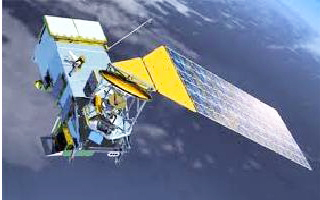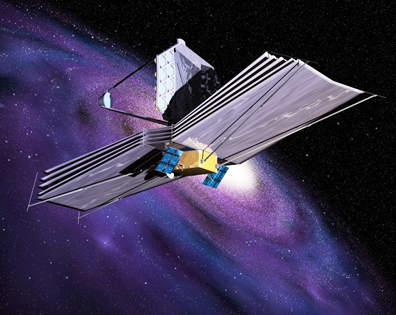U.S. Senate Appropriations Committee... They Are Worthy... (Spacecraft)
[SatNews] Alice Lipowicz of Federal Computer Week has filed the following story regarding funding activity for NASA and NOAA...
The
Senate Appropriations Committee would cut some science and technology budgets while allocating large increases for next-generation projects that include the
Commerce Department’s polar satellite and
NASA’s space telescope. The committee approved the Commerce, Justice, Science and related agencies spending package totaling $53 billion for fiscal 2012, $626 million below the fiscal year 2011 enacted level, according to a Sept. 15 news release.
 Artistic rendition of NOAA's JPSS...
Artistic rendition of NOAA's JPSS...
Sen.
Barbara Mikulski (D-Md,), who chairs an
Appropriations Committee subcommittee with jurisdiction in this area, described it as a “spending bill that has less to spend” that nonetheless allocated more than $12 billion to scientific research and development, which is expected to contribute to job creation. The Senate appropriations bill would provide $920 million for the
National Oceanic and Atmospheric Administration’s
Joint Polar Satellite System, $438 million more than the fiscal 2011 amount. It also is more than twice the $430 million allocated by the House appropriations bill. The satellite is being developed for advanced weather forecasting efforts. “Due to this increase, NOAA’s other programs will face administrative and overhead reductions,”
Mikulski said. Overall, NOAA would receive $5 billion in the Senate committee bill, which was $434 million above the fiscal 2011 enacted level.
 Artist's impression of the James Webb Space Telecope.
Artist's impression of the James Webb Space Telecope.
Credit: ESA
The Senate package also would fund NASA’s
James Webb Space Telescope at $530 million, which was substantially more than the $374 million requested in the Obama administration's budget. NASA would receive $17.9 billion, a reduction of 2.8 percent from the fiscal 2011 enacted level. While the Webb telescope has gone significantly over its initial budget, the Senate committee provided enough funds — if the measure survives the rest of the approval process — to enable the scheduled 2018 launch of the telescope. The panel also said it would cap total costs for the project at $8 billion.
Other science programs would see reductions under the Senate bill. The
National Science Foundation would get funding of $6.7 billion in fiscal 2012, $162 million below the current enacted level. The
National Institute for Standards and Technology would receive $680 million, $70 million below the fiscal 2011 enacted level. The senators did not include any money for NIST’s Technology Innovation Program and Baldrige Excellence Program. The Senate has not yet voted on the appropriations bill, and the approved Senate bill needs to be reconciled with the final House version before the spending package can become law.
Topical Tags :
Regional Tags :



